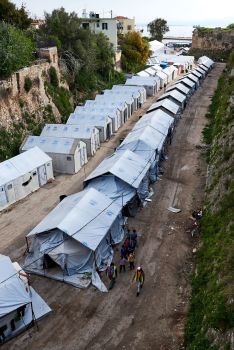Refugee Poets
Posted on
A few years ago, travelling across Iran and Afghanistan, I was amazed by the social capital of poetry – its value outside the academic box it tends to get squeezed into in the west. I met farmers who could recite hundreds of verses while reaping their crops, former soldiers who had recited on the front-line to stir their comrades, political activists who had chanted medieval verses in demonstrations against their government. Now that spirit is coming to Europe.
During workshops at the refugee education centre on Chios, BAAS, I worked with young Afghans, Syrians, Iraqis, Yemenis and students from many other countries, composing verses about a range of subjects. These included unrequited love, the desolation of losing family members, sexual betrayal, homesickness, surrealism. I've never been so convinced that poetry has value – listening to the verses as the students read them out, then teasing out translations, words batted back and forth across the table, we were digging inside each other's inner psyches, peeling back the skin, reaching towards each other. Sometimes it felt bruising, sometimes ecstatic, always human. The powerful feelings expressed by the students reinforced the depth and range of experiences so many of them have lived through. It's part of their struggle to find some kind of form, if not meaning, for what they have been through. Poetry is a powerful way of doing that.
If you would like to see some examples of the refugees' poetry, take a look at the BAAS website: https://medium.com/chios-voices/en/home. And if you would like to support the work of BAAS (which provides free education for young refuges), please consider sending a donation through: https://www.gofundme.com/RefugeeEducationChios. I know from my experience on Chios that it would be well spent.
 For the last month, I have been working in a school for refugee children. The school is run from an old barber’s shop and a doctor’s surgery on the island of Chios, just a few miles from the Turkish coast, an island once famous for the mastic it supplied to the Ottoman sultans, and as the possible home of the epic poet Homer. More recently, it’s become known as one of the major landfalls for refugees fleeing persecution and war in the Middle East and Africa. The UNHCR, the Greek municipality and various NGOs work together to provide them basic shelter and provisions, but one fundamental human right was missing until a year ago - the provision of education.
For the last month, I have been working in a school for refugee children. The school is run from an old barber’s shop and a doctor’s surgery on the island of Chios, just a few miles from the Turkish coast, an island once famous for the mastic it supplied to the Ottoman sultans, and as the possible home of the epic poet Homer. More recently, it’s become known as one of the major landfalls for refugees fleeing persecution and war in the Middle East and Africa. The UNHCR, the Greek municipality and various NGOs work together to provide them basic shelter and provisions, but one fundamental human right was missing until a year ago - the provision of education.